CogAT Kindergarten – What Is It and How to Help Your Child Prepare
The Kindergarten CogAT® (Cognitive Abilities Test) is often one of the first formal assessments a young child will take. It evaluates how children reason with words, numbers, and images, long before they have mastered reading or math. The test doesn’t require specific academic knowledge. Instead, it focuses on how your child thinks, makes connections, and solves problems.
This early gifted and talented test plays a key role in identifying children with advanced learning potential and is often used for placement in gifted and enrichment programs.
What Makes the Kindergarten CogAT Unique?
At the Kindergarten level, the CogAT is designed to be accessible for early learners:
Most questions are picture-based.
Students do not need to read or perform complex math calculations.
Instructions are usually read aloud.
It measures verbal, quantitative, and non-verbal reasoning.
Because it’s likely your child’s first test-taking experience, it’s important to help them feel comfortable with how the test works, especially if a bubble sheet is used to record answers.
Are you looking for more ways to prepare your child for the Kindergarten assessment? TestingMom offers over 1,000 practice questions specifically designed for the CogAT K-2, along with valuable resources to support parents.
CogAT Battery Subtests
The CogAT is divided into three main batteries: Verbal, Quantitative, and Non-Verbal. Each contains subtests that assess different reasoning abilities using pictures, numbers, or shapes.
Quantitative Battery
- Number Puzzles
- Number Analogies
- Number Series
Verbal Battery
- Verbal Analogy
- Sentence Completion
- Verbal Classification
Nonverbal Battery
- Figure Classification
- Paper Folding
- Figure Matrices
1) Quantitative Battery: Number Puzzles
The CogAT Quantitative Battery Number Puzzles assess a student’s quantitative reasoning skills. In this section, students encounter a series of mathematical puzzles and number sequences. Their task is to identify the missing number within these sequences based on established patterns or mathematical rules. These puzzles challenge students’ ability to solve mathematical problems using critical thinking and logic, often involving concepts such as arithmetic operations, number patterns, and numerical relationships. Success in this section demonstrates a student’s proficiency in quantitative reasoning, making it an essential part of the CogAT for evaluating their mathematical cognitive abilities.
Example #1:
Parent, say to your child: Look at the example below. Do you see how the first tugboat is pulling a tugboat with 3 red boxes? Now look at the second tugboat. It is pulling one boat with 2 red boxes. We need to add another boat where this question mark is, so that this tugboat will pull the same number of red boxes as the first tugboat. Which boat should we add so the second tugboat will be pulling 3 red boxes?
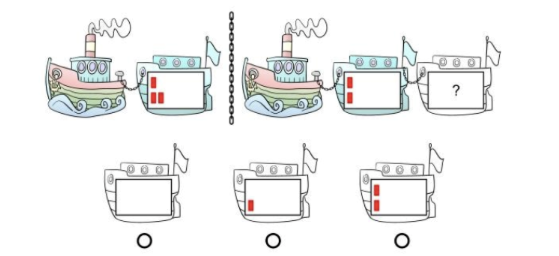
2) Non-verbal Battery: Figure Classification
Parent, say to your child: Look at the shapes on top. They are alike in some way, and so they belong together. Choose one shape from the bottom row that belongs with the figures on top.
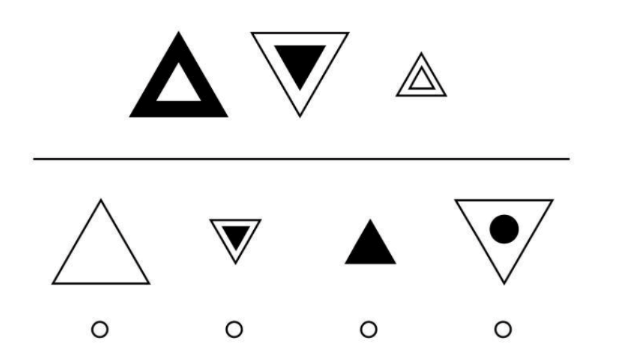
3) Verbal Battery: Verbal Analogy
The CogAT Verbal Battery Verbal Analogy section is designed to assess a student’s verbal reasoning and language abilities. In this section, students are presented with pairs of words that share a specific relationship, and their task is to identify another pair of words that demonstrate the same or a similar relationship. This portion of the test evaluates a student’s vocabulary, verbal reasoning skills, and ability to discern and apply analogical relationships between words. It challenges students to think critically and make connections between words based on their meanings and associations, making it a valuable component of the CogAT for evaluating their verbal cognitive abilities.
Example #3:
Parent, say to your child: ‘Look at the two pictures at the top. They go together in some way. Now, look at the picture in the bottom box, and then look at the answer choices. Do you see a picture among the answer choices that goes with the picture on the bottom, the same way the pictures on top go together?’
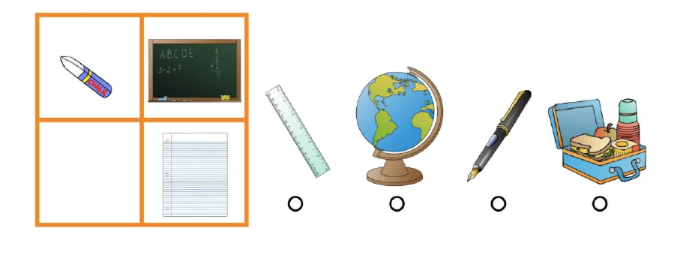
4) Quantitative Battery: Number Series
Example #4:
Parent, say to your child: Look at the example below. This is an abacus. The beads in the first 5 rods form a pattern or follow a rule. The beads in the sixth rod are missing. Can you choose the rod that goes in the sixth place that would complete the pattern or follow the rule?
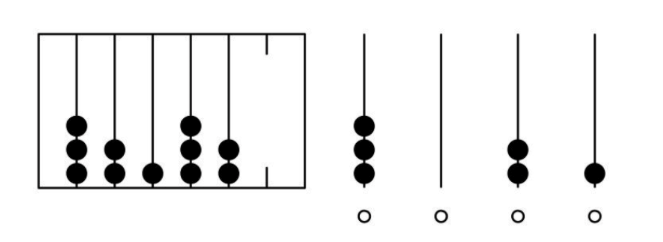
5) Non-verbal Battery: Paper Folding
The CogAT Non-Verbal Battery Paper Folding assesses a student’s non-verbal reasoning and problem-solving skills. In this test section, students observe a series of images depicting paper folding and hole-punching actions. They must predict the final outcome when the paper is unfolded. This section evaluates a student’s ability to visualize spatial transformations and comprehend complex folding and hole-punching results. It encourages critical thinking, visual information analysis, and logical deduction, making it a crucial part of the CogAT for assessing various cognitive abilities.
Example #5:
Parent, say to your child: Take a look at the pictures across the top. They show a piece of square paper being folded. Then, one or more holes are punched in the folded piece of paper. Can you point to the answer that shows what the unfolded square piece of paper will look like?
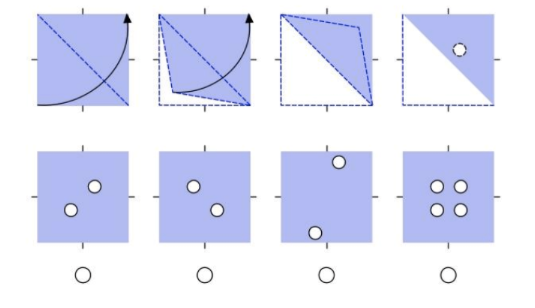
Answers:
1) Option 2
2) Option 2 – a triangle with a triangle inside
3) Option 3 – the pen
4) Option 4 – that would complete the pattern 3,2,1,3,2,1
5) Option 1
Why Start Practicing Now?
Practice builds confidence! The CogAT may be your child’s first formal test, and with early exposure to question types, they’ll feel comfortable and prepared when the big day arrives.
Sign up now to get 100 FREE CogAT practice questions designed specifically for Kindergarten students!
Want Personalized Help?
If you’re looking for more focused support, our one-on-one online CogAT tutoring can make a world of difference. Our experienced tutors work with young learners using play-based strategies that help build thinking skills and test-taking confidence.
Schedule a FREE consultation with a CogAT expert and give your child a head start!
See if TestingMom.com supports your child’s test by your school district. If you don't see your child's school district listed, check with us! We have practice for other tests as well.



Tell us about your experiences
32 Responses
Aubree Campbell
Ok so it says on here that kindergarteners do not record answers on bubble sheets? Or sometimes they do, but typically not? My kindergartener said she had to color in the circle for her answer, A, B, or C. Her scores told us she did not require Quest services. She was also not taken with the other two students to take her test. Her teacher had to ask them to test her because we turned in the paperwork/ application on time and it seemed like they forgot. She was taken at a later date than the other two kids in her class, and I would like to know why that would be. I would also like to know if these odd circumstances could have had an affect on her scores seeing as how these events just do not add up to a professional, timely and fair examination of a child’s cognitive abilities.
Papy
I’m a Senior Training and Recruitment Officer; I need some test of Figure classification to perform my knowledge
TestingMom.com
Hi Papy –
Thank you for your comment. Unfortunately, our resources only extend through the 8th grade. I wish you the best!
Marcus
ritu.us30@yahoo.com
This was helpful
arpitshah99@gmail.com
excellent
kbkhanam@gmail.com
Good
Lakshmi
Its really helpful …thanks for the information
smuro20@gmail.com
My child answered these correctly. Is there a practice test for kinder?
maithilidabke@gmail.com
She gave all answers correctly. And she explained it properly
harshpal123@gmail.com
i like this test its so much fun
lakshmisoujanya5@gmail.com
I like testing
Nicole
Great job in providing useful information to guide my instruction and more importantly delivery of questions.
Katie
Thank you!
leela.kumili@gmail.com
Practice questions
TestingMom.com
Our 100 Free Questions are a great sampling from many of the tests we support. Here are step-by-step instructions on how to access the 100 Free Practice Questions (No purchase necessary):
Go to www.testingmom.com and log in using your email address and password.
Once you are logged in, click the “100 FREE QUESTIONS” button on the left-hand side of the page Or, you can follow this link: 100 Free Questions.
Once redirected, you will see a large, blue box that reads “FREE QUESTIONS.” Click the orange button that reads “UNLOCK NOW.”
We look forward to having you onboard with us!
Best regards,
Marcus
Garima
Looking for Cogat practice for kindergarten
TestingMom.com
Our 100 Free Questions are a great sampling from many of the tests we support. Here are step-by-step instructions on how to access the 100 Free Practice Questions (No purchase necessary):
Go to www.testingmom.com and log in using your email address and password.
Once you are logged in, click the “100 FREE QUESTIONS” button on the left-hand side of the page Or, you can follow this link: 100 Free Questions.
Once redirected, you will see a large, blue box that reads “FREE QUESTIONS.” Click the orange button that reads “UNLOCK NOW.”
We look forward to having you onboard with us!
Best regards,
Marcus
NINA
I am homeschooling my grandson.
TestingMom.com
Great! We have tons of material for students who are homeschooled!
AJ Kumar
Greetings:
My son is 6 years old and he has to get admission in Gifted School. We are told that to get admission in a Gifted School my son needs to take a Kindergarten level CogAT. Please guide us how to take some practice CogAT test online for free.
shilpa_nangalia@yahoo.com
Need to know the steps to download 100 Free questions . I am already a free member signed up into TestingMom.com
TestingMom.com
Hello,
Please reach out to our Parent Success Team at help@testingmom.com or by calling (877) 609-6203. They will be more than happy to assist you!
Quan
I love to help my daughter with her coming GT tests.
jazzmine.jackson@rocketmail.com
How do I get the free 100 questions?
TestingMom.com
Hi Jazzmine,
Please make sure you are logged into your free account and use this link: https://www.testingmom.com/buy-now/?free-questions=1&_ga=2.172705828.686181089.1612201078-2107964243.1601307955
All the best,
Marcus
Jo Ann
I daughter will be in Pre-K 4 now and will be Kindergarten (she will be 5 in March) in August 2023.
TestingMom.com
Hello,
The CogAT is a highly complex test! I would certainly recommend using our CogAT Practice Questions. We also have many outstanding tutors for the CogAT! Please schedule a call with one of our Educational Account Specialists to learn more about our online tutoring options!
avisfowlkes@hotmail.com
Very good the tests and questions were very good. My granddaughter enjoyed the reading the books. We really like this site.
Jennifer
Thank you for giving us a sample test! It was fun and we liked it! It was awesome!!
Kindergarten Class
TestingMom.com
We are delighted that you had fun!
Dante
Hello, I’d like to try the sample questions. Thanks.
TestingMom.com
We’re excited to share our 100 Free Questions with you! It’s a fantastic way to try out a variety of the tests we offer. Plus, you don’t have to make any purchases to access them. Here’s a quick guide on how to get started:
First, head to www.testingmom.com and sign in using your email and password.
Once you’re in, you’ll see a “100 FREE QUESTIONS” button on the left-hand side of the page.
Alternatively, you can use this link: 100 Free Questions.